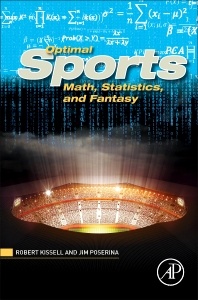Optimal Sports Math, Statistics, and Fantasy
Auteurs : Kissell Robert, Poserina James

Optimal Sports Math, Statistics, and Fantasy provides the sports community?students, professionals, and casual sports fans?with the essential mathematics and statistics required to objectively analyze sports teams, evaluate player performance, and predict game outcomes. These techniques can also be applied to fantasy sports competitions.
Readers will learn how to:
- Accurately rank sports teams
- Compute winning probability
- Calculate expected victory margin
- Determine the set of factors that are most predictive of team and player performance
Optimal Sports Math, Statistics, and Fantasy also illustrates modeling techniques that can be used to decode and demystify the mysterious computer ranking schemes that are often employed by post-season tournament selection committees in college and professional sports. These methods offer readers a verifiable and unbiased approach to evaluate and rank teams, and the proper statistical procedures to test and evaluate the accuracy of different models.
Optimal Sports Math, Statistics, and Fantasy delivers a proven best-in-class quantitative modeling framework with numerous applications throughout the sports world.
Jim Poserina is a web application developer for the School of Arts and Sciences at Rutgers, the State University of New Jersey. He has been a web and database developer for over 15 years, having previously worked and consulted for companies including AT&T, Samsung Electronics, Barnes & Noble, IRA Financial Group, and First Investors. He is also a partner in Doctrino Systems, where in addition to his web and database development he is a systems administrator.
Mr. Poserina has been a member of the Society for American Baseball Research since 2000 and has been published in the Baseball Research Journal. He covered Major League Baseball, NFL and NCAA football, and NCAA basketball for the STATS LLC reporter network. In addition to the more traditional baseball play-by-play information, the live baseball reports included
- Statistical approaches to predict winning team, probabilities, and victory margin
- Procedures to evaluate the accuracy of different models
- Detailed analysis of how mathematics and statistics are used in a variety of different sports
- Advanced mathematical applications that can be applied to fantasy sports, player evaluation, salary negotiation, team selection, and Hall of Fame determination
Date de parution : 04-2017
Ouvrage de 352 p.
15x22.8 cm
Thème d’Optimal Sports Math, Statistics, and Fantasy :
Mots-clés :
Adaptive regression analysis; Assists; Baseball; Basketball; Batting average; Bill James; Billy Beane; Bowl Championship Series (BCS); Box scores; Chi-square distribution logistic model; College football; Corner kicks; Correlation; Cumulative distribution function (CDF); Data reduction; Dependent variables; Distribution functions; Drafting; Explanatory factors; Fantasy sports; Field goal percentage; Football; Game scores; Games points; Hall of fame evaluation; Head-to-head; Henry Chadwick; History of sports statistics; Hockey; Independency; Independent variables; Linear regression; Log regression; Log-linear regression; Log-normal distribution; Logistic model; Logistic probability; Logit model; Logit points; Logit regression; Logit spread; MLB; MLS; Moneyball; NBA; NFL; NHL; National Collegiate Athletic Association (NCAA); National team selection; Neural networks; Neural networks (NNETs); Nonlinear regression; Normal distribution; Odds ratio; Offsides; On-base percentage (OBP); Optimization; Ordinary least squares (OLS); Passer rating; Passing; Points; Power function; Principal component analysis (PCA); Probability; Probability distribution function (PDF); Probability model; Probability of winning; Quarterback rating; Ratings Percentage Index (RPI); Rebounds; Regression; Retrosheet; Run batted in (RBI); Run creation; Rushing; Sabermetrics; Salary negotiation; Sampling; Save percentage; Score; Sensitivity analysis; Shooting percentage; Shots on goal; Simulation; Soccer; Sports pools; Statistics; Team and player trades; Team rating; Team ratings; Team statistics; Team strength; Training and learning; What-if analysis; Win probability added (WPA); Winning margin; Winning score; Wins ratio; Wins-ratio
